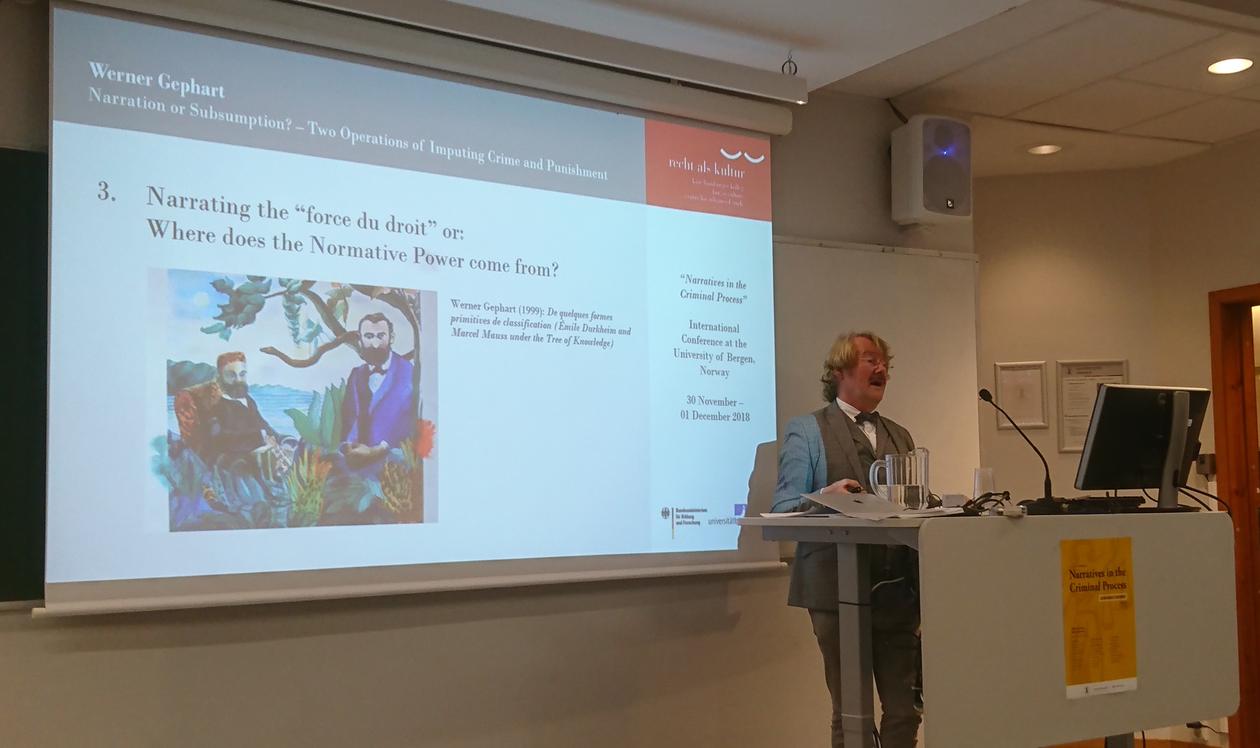Narratives in the Criminal Process – Conference Report
The international research conference Narratives in the Criminal Process took place at the University of Bergen on Friday 30 November and Saturday 1 December 2018. More than 50 scholars, researchers and students attended 28 presentations of papers on various subjects in the interdisciplinary field of law, humanities, media and social sciences.

Main content
Inspired by Peter Brooks’ claim that «law needs a narratology», some of the central questions discussed were the following: What is the significance of narratives in the legal process? How do narratives influence the decision-making process of judges and jurors? What characterizes the court’s own narratives in judgements and judicial opinions? How do narratives shape press reports about criminal cases?
The conference was organized by the research project A Narratology of Criminal Cases that is funded by the Research Council of Norway. The organizing team consisted of principal investigator Frode Helmich Pedersen, postdoctoral researcher Espen Ingebrigtsen and phd student Erlend Liisberg. The venue was the Faculty of law of the University of Bergen, situated at Magnus Lagabøtes plass 1.
Friday
The first day of the conference began with words of welcome by PI Frode Helmich Pedersen. Then Jeanne Gaakeer (Rotterdam) held her keynote lectures about “Judicial Narration as Explanation of Facts and Circumstances”. Professor Gaakeer illustrated what she considers to be important building blocks from philosophical hermeneutics and (legal) narratology for judicial practice by means of an analysis of case law.
On Friday, 4 interesting talks were given in plenary sessions:
- Peter van Koppen (VU Amsterdam): Anchored Narratives 25 years later
- Tor Langbach (Trondheim): Narratives in court. The different perspectives of the prosecutor, the defence lawyer and the judge
- Hans Petter Graver (Oslo): Between Structure and Action. Using Narratives to Explain Legal Reason
- Arild Linneberg (Bergen): Stories, Law and Justice. The Place of Narratives in the Field of Law and Humanities.
In 4 parallel sessions, 10 papers were presented:
- Bjørn O. Berg (Trondheim): The Story in the Judgment and the Standard of Proof
- Erlend Liisberg (Bergen): The Court’s Account of Events in the Norwegian Criminal Judgment
- Silje Warberg (Trondheim): Sevlegutten’s Legacy. Between Court-Proceedings and Oral Tradition
- Ivana Marković (Belgrade): The CSI-Narrative and its possible effect on the criminal process
- Vidar Halvorsen (Oslo): Narrativity, Truth and History: Epistemic Reflections on the David Irving Libel Case
- Line Norman Hjorth (Bergen): Language games in the courtroom
- Mieke Vandenbroucke (Ghent): To Love or Not to Love. The Legal-discursive Afterlife of Narratives of Love in Belgian Marriage Fraud Investigations
- Per Jørgen Ystehede (Oslo): ‘Two Suspicious Persons’ and the rise of the Norwegian Press Complaints Commission
- Tara Søderholm (Oslo): Stories of crime and criminal justice. News values and narrative opportunities
- Corina Löwe and Beate Schirrmacher (Växjö): How to Tell the Story of a Trial and Why. The Narrative Structure of Journalistic Court Reporting.
The discussions were continued in the restaurant Bien Centro in the afternoon. Subsequently a public debate about the conference theme was organized at the House of Literature in Østre Skostredet 5–7. In a vivid debate moderated by postdoc Espen Ingebrigtsen, the professors Greta Olson, Peter van Koppen and Matías Martínez discussed the significance of narratives in the criminal process. The debate will soon be posted.
Saturday
In the first lecture on Saturday, professor Matías Martínez (Wuppertal) raised the question “Is There a Language of Truth?” in his keynote lecture. Professor Martínez discussed whether objective linguistic features may be found that signify credibility of witness accounts in court hearings.
The following intriguing plenary talks were given on Saturday:
- Greta Olson (Giessen): Narrating Culpability in the Case of Susanne from Mainz. Immigration Fears and Reported Details
- Werner Gephart (Bonn) Narration or Subsumption? Two Operations of Imputing Crime and Punishment
- Ralph Grunewald (Madison): Narratives of Guilt and Innocence: The Evidentiary Power of Narrative in Wrongful Conviction Cases
- Frode Helmich Pedersen (Bergen): The Narrative in the Judgment.
Furthermore, 8 papers were presented in 4 parallel sessions:
- Gunilla Byrman and Joacim Lindh (Växjö) Narratives on Abuse in Investigations and Trials
- Julie Høivik (Oslo): Storytelling in Court Cases Concerning Violence towards Police Officers
- Espen Ingebrigtsen (Bergen): Speech Representation in written Norwegian judgments
- Audun Kjus (Oslo): Quotations in and of the Witness Statements in Criminal Trials
- Chen Meng Lam (Singapore): Using Artificial Intelligence in Narratives in the Criminal Process
- Michał Peno (Szczecin): Criminal Law: Between Fiction and Values
- Marlene Weck (Freiburg): Narrated History in the Court. Records of the International Criminal Tribunal for the Former Yugoslavia (ICTY)
- Helena Whalen-Bridge (Singapore): Comparative Legal Narrative: Framework for First Instance Proceedings
The many intriguing presentations and the vivid discussions made the conference Narratives in the Criminal Process to a fruitful exchange of perspectives in the interdisciplinary field of law, humanities and social sciences. The organizing team would like to thank all speakers for contributing to make the conference a great success. We are looking forward to continue the discussions that emerged from our meeting in Bergen.
